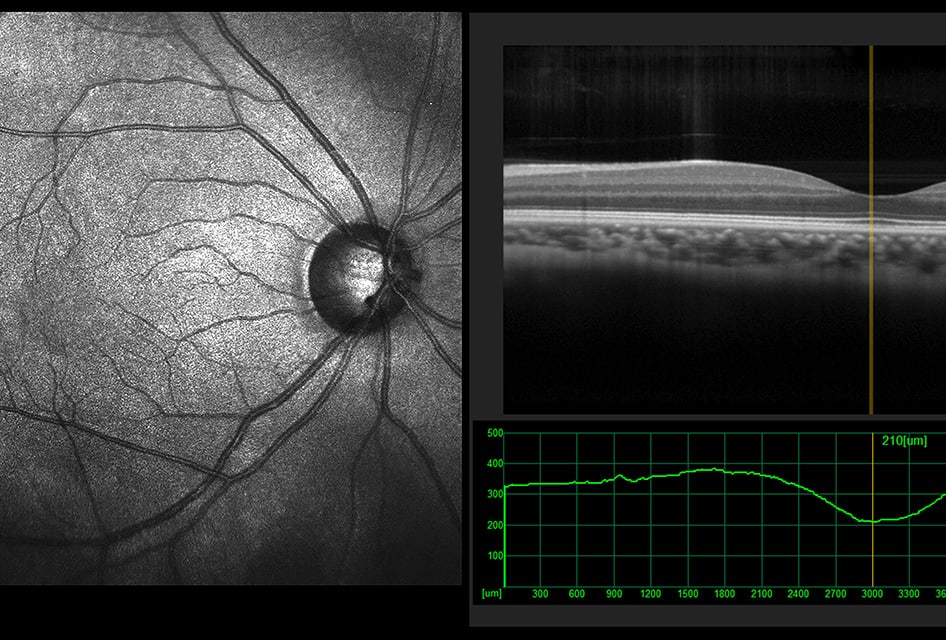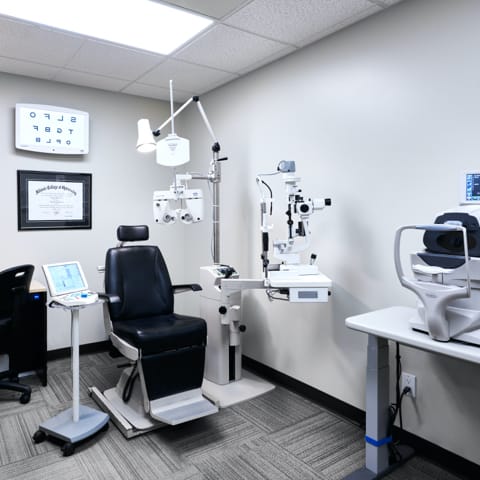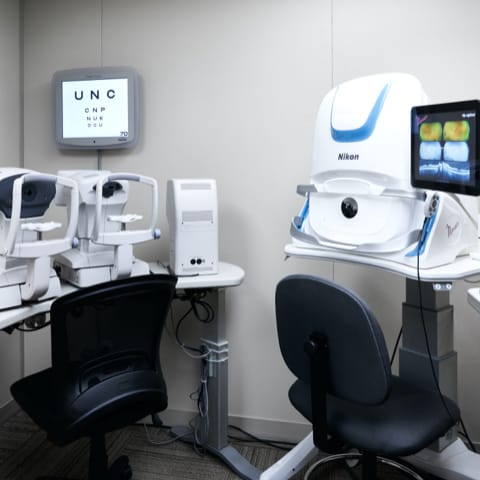Protect Your Vision While Taking Plaquenil
People who have been prescribed Plaquenil (hydroxychloroquine) for rheumatoid arthritis, lupus, or malaria need to pay special attention to their vision.
Vision loss is a rare but serious possible risk of taking Plaquenil, especially for those who have taken the drug for more than 5 years.
We provide baseline evaluations and ongoing testing for people on Plaquenil so we can detect any changes in vision as soon as possible. If eye complications are discovered due to Plaquenil, we will work with your health care team to find a suitable alternative medication for your particular health condition in hopes to prevent further permanent vision loss.
What Is Plaquenil (Hydroxychloroquine) & How Does it Affect My Eyes?
Plaquenil is the brand name for a drug called hydroxychloroquine. It was originally developed as a malaria treatment. More recently, it has been used to treat autoimmune conditions, including lupus and rheumatoid arthritis.
In rare cases, Plaquenil can cause irreversible damage to the macula or retina, particularly after many years of use. If you’re on this drug, it’s very important to have regular eye exams that include diagnostic imaging.
See both your eye doctor and rheumatologist immediately if you notice any changes to your vision so your eyes can be assessed and your medication stopped, if needed.

What to Expect in Your Plaquenil Evaluation
A baseline exam prior to starting Plaquenil lets us know what’s normal for your eyes.
In this exam, we’ll use diagnostic imaging to create a detailed record of the health and structure of your eyes. We’ll dilate your pupils, which provides us the best possible view inside your eyes.
Your exam includes:
- Fundus photography, which is a digital photo of the back of your eye, including the retina and macula
- Optical coherence tomography, which is a cross-section view of your retina
- Visual field testing, to assess your peripheral vision
How Often Should I Have an Eye Exam?
After your baseline exam, we’ll likely want to see you every 9 to 12 months to check your eyes and ensure your vision is still in good shape.
If you’ve been on Plaquenil for 5 or more years, we might recommend a more frequent schedule.
If you notice any new visual symptoms, book an appointment with us right away and contact your physician immediately.
Symptoms to Watch For
Vision loss from Plaquenil is rare, but it’s still important to be aware of symptoms and report them to your optometrist and rheumatologist right away.
- Any change in your vision
- Seeing a shimmering ring of light
- Change in central vision
Visit Us In Whitehorse

Our Address
- 2093 2nd Avenue
-
Whitehorse,
YT
Y1A 1B5
Our Contacts
- Phone: 867-668-2020
- Fax: 867-667-6526
- Email: eyes@northernlightsoptometry.ca
Find us in downtown Whitehorse across from the Yukon Visitor Information Centre, just steps from Main Street and the Yukon River.
For your convenience, we are wheelchair accessible.
Hours of Operation
- Monday: 8:00 AM – 5:00 PM
- Tuesday: 8:00 AM – 5:00 PM
- Wednesday: 8:00 AM – 5:00 PM
- Thursday: 8:00 AM – 5:00 PM
- Friday: 8:00 AM – 5:00 PM
- Saturday: Closed
- Sunday: Closed
Hours of operation may vary on holidays.

Our Brands




Our Testimonials
We’ve been going to Northern Lights Optometry for 20 years. The service has been always first class. The staff are professional, courteous and knowledgeable about the products they sell. This all lead by Dr. Gorrell who is the consummate professional, always gives professional no BS advice and is always friendly. He is fantastic with kids and helped my son make the transition from glasses to contacts when he was 9. 6 stars for me!!
Marcel B.
Friendly staff and expert advice. We are very fortunate to have this level of service and selection in Whitehorse. They went above and beyond to help me out in a jam! Thanks for the great service and quality care!
Jordan S
Northern Lights Optometry has taken care of my ocular health for the past 30 years. I’ve never had anything but good experiences. Pleasant, knowledgeable staff and kind, professional service are the standard.
Sarah H.
Always a great, professional, and knowledgeable experience for myself and my family, whether it’s a regular eye exam or a diabetic exam. I’ve been a patient at Northern Lights for over 25 years, and I’ve always received the quality customer service I’ve come to expect because that’s what I’ve always received. Great selection of glasses and sunglasses at competitive pricing. I highlight recommend Dr. Gorrell and his staff.
Jill N.
Had been having headaches and fatigue for months when it was suggested I have my eyes checked. Has not had my eyes checked in ten years. I was referred to see Dr. Guy Gorrell by a good friend. Dr. Gorrell was professional and very thorough in his assessment of my eyes and overall vision. In the end Dr. Gorrell was able to diagnose that my eyes did in fact need a prescription lens and my headaches and fatigue were likely due to my straining my eyes to see properly. His friendly and helpful staff assisted me in choosing my frames and in a very short period of time my glasses were available. Since having the prescription glasses my headaches and fatigue have stopped and I am very pleased. I highly recommend Dr. Gorrell and his staff at Northern Lights Optometry.

















